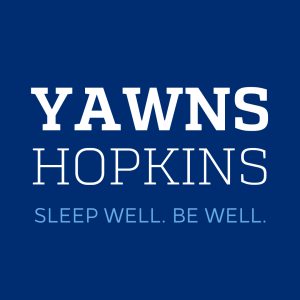Sleep
Overview
Sleep is an integral part of health and well-being. If you are finding it hard to concentrate on your work, feeling stressed, or physically tired, you may not be getting enough or quality sleep at night. In addition, sleep is critical to learning since your brain processes information throughout the night. Without sleep, your brain wouldn’t be able to create or maintain pathways that help you make decisions, learn, and create new memories. Check out the information below to learn how to improve sleep.
Programs
Yawns Hopkins Initiative
Yawns Hopkins is a sleep initiative focused on providing free sleep kits and education to JHU students and trainees on sleep hygiene and habit-formation to improve overall well-being. To request a free sleep kit that includes a mask and ear plugs, fill out this form. Note: sleep kits can only be picked up on the East Baltimore and Homewood campuses. Students and trainees can only request sleep kits two weeks in advance. If you would like sleep kits at your next event, email Molly Hutchison at mhutch12@jhu.edu.
Refresh Sleep Email Program
The Refresh Sleep Program was developed at Stanford University and aimed at incorporating cognitive behavioral therapy strategies to increase sleep quantity and quality for college students. Since its development, Refresh has become a common program offering at universities. Participants of the Refresh program will receive an educational email every week for 8 weeks.
Participants of the Refresh Program will learn:
- The physiology of sleep
- Sleep hygiene strategies
- Creating a positive sleep environment
- Relaxation and mindfulness strategies
- Barriers to sleep
- Keeping track of sleep
Participants will be asked to spend 20 minutes on this program per week reading over the information, incorporating the strategies, and tracking their sleep.
The Refresh Sleep Program will be back in Fall 2022! Check back on this page or on the Health Promotion and Well-Being Instagram (@CHEWatJHU) for more information in September.
Tips for Better Sleep
If you find you are struggling to fall asleep at night or feel rested when you wake up in the morning, try exploring these sleep tips to improve your sleep hygiene. Need help personalizing your sleep plan? Email our health educator, Molly to set up a meeting and chat about your personal sleep habits.
Sleep Deprivation
Sleep deprivation occurs when you don’t get the necessary amount of sleep your body needs at night. Effects of sleep deprivation occur if you continuously ignore your body’s need for sleep for a period of time. Check out the image below from Healthline to learn more about how sleep deprivation can impact your health long-term.
Resources
- The National Sleep Foundation is dedicated to improving health and well-being through sleep education and advocacy. Founded in 1990 by the leaders in sleep medicine, NSF is the trusted resource for sleep science, healthy sleep habits, and sleep disorders to medical professionals, patients, and the public.
- Sleep Education is a sleep information resource funded by the American Academy of Sleep Medicine.
- Johns Hopkins Center for Sleep Disorders If you are having trouble sleeping, staying asleep, or are feeling sleepy much of the time, you may have a sleep disorder. The sleep specialists at the Johns Hopkins Center for Sleep Disorders in Columbia, Md are dedicated to providing the highest quality care for the diagnosis and treatment of sleep disorders. For more information or to schedule an appointment visit their website.
- SleepMatters is an animated educational sleep module app composed by an interdisciplinary team of sleep experts at The Johns Hopkins University School of Medicine. Learn more about the key concepts to basic sleep physiology and common sleep disorders through an engaging and animated educational experience.
- The Sleep Better series provides helpful information, resources, and tools to address common sleep issues and get a more restful night’s sleep.
